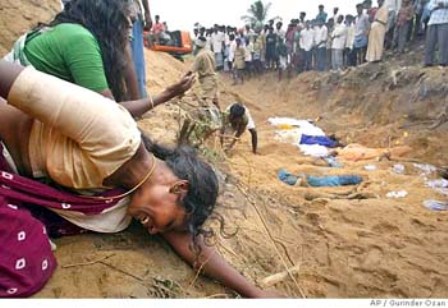| With the first news of the disaster reaching the volunteers, The adrenaline started flowing in blood. Without the proper information on the nature, extent and the precise locations, it was very difficult to proceed. But there was no stopping and waiting. Early in the morning at 3 am the first Sankalp volunteer left for disaster hit areas in Tamil Nadu. |  |
We were the first from outside Tamil Nadu to have reached Nagapattinam for help. The scene was not at all good. Its only a miracle that our volunteer who had not seen death in its most gruesome form earlier did not get traumatized on seeing 3000 human bodies dumped over one other at the base hospital in Nagapattinam. The little we could do then was to assist the Red Cross in disposing off the bodies and handling them to the people who wanted to take back their dear one's body. Students from our college came forward and relief supplies were gathered and transported to Nagapattinam. There was not much that we could do for the victims there. But it spark us to proceed on the road that led to Disaster Mitigation and Management Group.
Sankalp Unit
Comments
nill
i personally feel that when we compare ourselves with developed countries we are still lacking behind not because of te fact that we dont want to do but we are not mentally prepare for new change people died due to lack of knowledge , accidents ,trauma & injuries thats the common scenario of india but still after the independence so many years had finished out but do we either have any trauma prevention and injury rehab national level policy or act depending upon annual data of injuries and casualties ALL OTHER DEVELOPED COUNTRIES HAVE national states medical councils and associations who so ever are induljed in patients , trauma mamagement and rehab should come up with this proposal so that valuable talent of INDIA can be saved both at rural and urban sectors
please get back to me at __ DR AKSHAT PANDEY , D-1011 INDIRANAGAR LUCKNOW UTTAR PRADESH INDIA

Tsunami taught us an important lesson in Disaster Mitigation and Management. We were lucky in the fact that we did not wait for days together after we heard the news of the disaster. We were right in deciding to take our armature foot forward first than choose the long way of deliberation, fund collection and delivery only after that.
When our Volunteer touched the shores of Nagapattinum, it was the town of the dead. The 3000 dead bodies-were still lying in open and the blank tearless eyes were wide open to see their loved ones stocked up in piles.
There was no dearth of food or water at that time. The state government had acted swiftly to-arrange for biscuits, water and packets of Sambhar Rice , but there was no one to distribute them.
Reaching out early to the disaster site explained to us the true meaning of Post trauma Stress Disorder. Staying there for 2 days, we did not take up a magic wand and rotate it around and expect it to soothe all pain. But we3 worked.. With our own hands. We took packets of food that were there to the people who wanted them. We registered the dead. We managed the ambulances.
Few days later, when we read about large scale mobilization of food grain and clothes, we knew that the time when people wanted these things had already gone. It was just too late. Newspaper reports confirmed un-imaginable wastage.
Sankalp decided to act in minutes after the disaster in all future happenings.